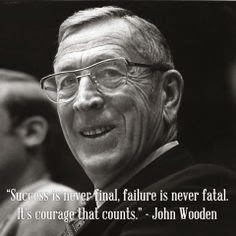I'm not much of a college basketball fan. Actually, I'm not much of a basketball fan, period.
So I feel that gives me a license to snicker at the outrage of people who are frantically filling out their NCAA Tournament brackets this week, hoping to win their office pools and complaining about the injustice of the selections.
Hey, the one good thing about the college basketball tournament — as I see it — is that the team that wins the national title really
wins it. It isn't some mythical designation, as it is in football.
(Truth be told, I've always been much more of a football fan. Sometimes I wonder if that is because I've always been short — by basketball standards. No one would ever confuse me for — as one of Woody Allen's girlfriends put it in
"Annie Hall" — a
"pituitary case trying to stuff a ball through a hoop.")
The teams that are clearly the best in the country always get to compete in the NCAA Tournament, even if they stumble in the opening round of their conference tournaments. There was never a chance that North Carolina or Kansas would wind up playing with the also-rans in the NIT, simply because they didn't play for their conference championships.
And some marginal teams always get the chance to compete in the national tournament because they, inexplicably, got hot at the right time and won their conference tournaments, even though their performances during the regular season weren't particularly memorable.
I kind of liked the way Bob Ryan of the
Boston Globe put it earlier this week. There really does seem to be something for everyone — or nearly everyone — in the NCAA Tournament.
But, while everyone seems to accept — and even anticipate — the upsets that inevitably occur, that doesn't keep them from complaining about them when they happen — and, sometimes, even
before they happen.
It's kind of like that old saying about the weather. You know the one I'm talking about. Everyone complains about the weather, but no one does anything about it. We all know that the atmospheric conditions in the spring will spawn tornadoes. Likewise, we know that the atmospheric conditions from late spring until late fall are likely to produce hurricanes. That doesn't stop people from complaining when they occur.
OK, that's an extreme example. People seldom die at basketball games.
But my point is that people
know these things will happen. The similarity is that no one knows where lightning will strike in the NCAA Tournament — just as no one knows where the next Hurricane Katrina will strike. The consequences are different, but the element of the unknown is the same.
Perhaps there is a certain advantage with a hurricane that people do not have with a tornado. There is usually some advance warning — a few days, at least — that a hurricane is on the way. Computer models can try to predict the path a hurricane will follow, but hurricanes are still subject to the laws of nature, and certain unexpected variables often come into play.
Upsets in the NCAA Tournament seem to be more like tornadoes. They happen without much warning — and, when they are over, the survivors are left shaking their heads and wondering what happened.
Speaking of computer models, many people seem to place the same faith in computer models when making their NCAA picks as they do in predicting the behavior of hurricanes.
The computer age really does make many things possible that were not possible even a few short years ago. But computers are just one of the tools that people can use. They can't replace human observation or human logic. They may be able to enhance them, but they can't replace them.
Matthew Futterman touches on this in the
Wall Street Journal.
"At first glance, it's nearly impossible not to pick Kansas over North Dakota State in the first round," he writes.
"Yet, when sports forecaster AccuScore ran 10,000 computer simulations of the game between the Jayhawks (25-7) and the Bison (26-6), Kansas lost 22.6% of the time."Does that make you more inclined to pick North Dakota State to prevail over Kansas? I would be surprised if it did. Logic still says Kansas will win that game.
Some sports writers do try to prepare their readers for the upsets to come, even if they can't pinpoint them in advance.
For example, Tom Knott of the
Washington Times wrote this week that the absence of star power means there will be upsets in the tournament.
Adam Himmelsbach looks for upset trends in the
New York Times by talking with coaches who pulled off such improbable victories in previous tournaments. But, as far as I can see, he never defined the formula that can absolutely propel an underdog to the next round.
Jerry Spar wrote in the
Boston Herald that the regular season and the conference tournaments suggest there should be many upsets.
"Off we go," he wrote,
"into the great wide open."Nevertheless, Spar gave his recipe for playing it safe in the tournament, suggesting that people who insist on filling out their NCAA brackets should pick North Carolina and Louisville for the national championship game.
And that's the thing to keep in mind, whether you're filling out the bracket and trying to devise the scenario that will win the money in your office pool or you're simply a casual observer.
Cinderella rarely wins it all.









